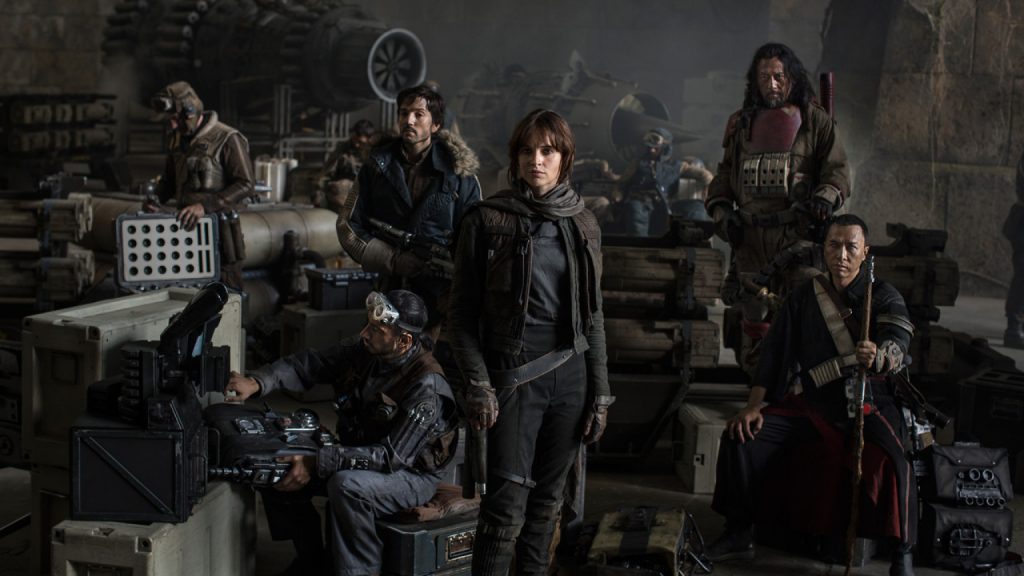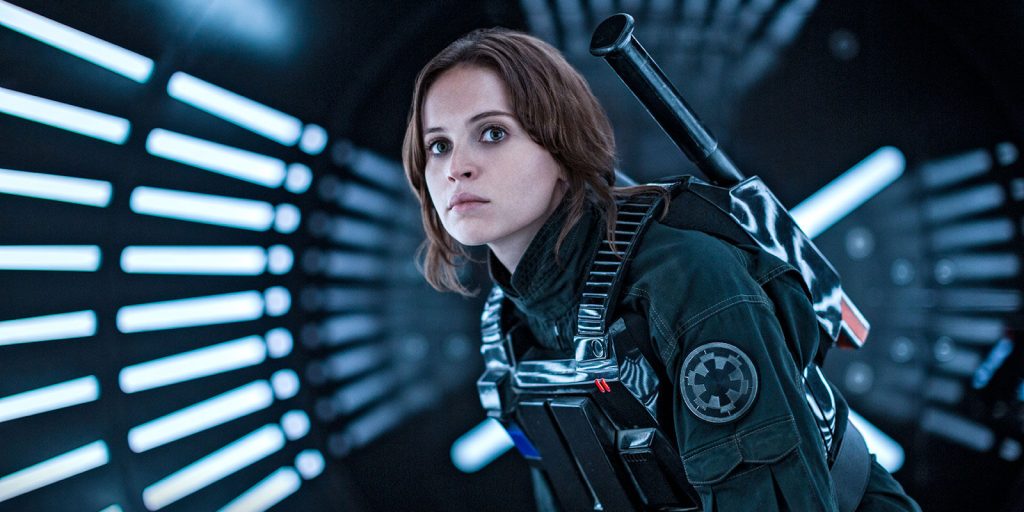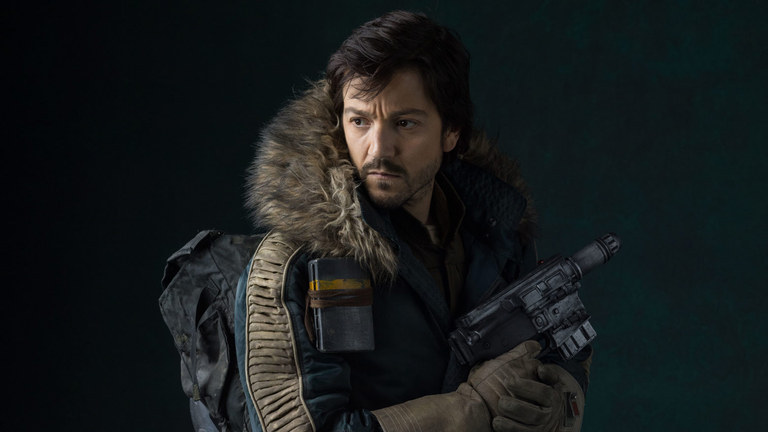some thoughts on Rogue One
Another Star Wars movie is released, and so the time has come for all denizens of the internet to remind the world that they would make a better Star Wars movie than anyone in Hollywood. I’ve been told that Rogue One is both too radical a departure and more of the same, that it’s both too grim and too superfluous, that its plot is both too complicated and too simple, that the story is both too esoteric and too obvious. These are the kinds of complaints that, to my mind, can only be the product of expectations. If one goes into a movie with a set of expectations and those expectations are unfulfilled, sometimes one’s response is to spend the running time looking for the movie expected instead of watching the one being screened.
But of all the complaints directed at Rogue One, the oddest one I’ve found is “the characters are thin.” This is absurd, since the characters in Rogue One are, by a long stretch, the most complex ever presented in a Star Wars movie. Generally speaking, the characters in a typical Star Wars movie are “one thing.” Obi-Wan Kenobi is “wise,” Luke Skywalker is “idealistic,” Leia is “spunky,” C-3PO is “fussy.” In 1977, Han Solo emerged as the breakout character of the series because he’s the only one who changes: he starts out as a murderous mercenary and slowly turns into a radicalized rebel. Darth Vader only becomes interesting as a character when we see him, in the original trilogy, go from being “pure evil” to being an individual caught between conflicting emotional impulses. The prequel trilogy squanders the opportunity to make Vader’s character more interesting by placing him on a straight road from “jerky kid” to “jerky teenager” to “jerky adult” before arriving finally at “victim.” The prequels are boring not because they lack plot but because Anakin Skywalker never changes. The key moment of his character arrives at the end of Episode III, when the Darth Vader mask is lowered onto his face, sealing his identity, and his destiny.
Speaking of masks and identity, the characters of Rogue One stand out in the Star Wars universe because, unlike most others, they are one thing, but they yearn to be another thing, while circumstances insist on them being a third thing. Identity is a strong theme running through Rogue One, identity and how it functions in society. One presumably knows who oneself is, but society often demands that one pretend to be someone one is not, to play a role. This happens to everyone to one extent or another, because social order otherwise disintegrates. Like Darth Vader, we all must wear masks as we play the roles of student, of employee, of spouse, of parent, of citizen. The conflicts in Rogue One emerge when characters get tired of playing their assigned roles, when they insist on expressing themselves, revealing who they “really are.”
As discussion of the Rogue One characters necessarily involves spoilers, be warned!
Who is Jyn Erso? Jyn is a young woman who was born into a life of comfortable wealth, but her father turned his back on wealth for the sake of ideals, and then turned to abject slavery for the sake of saving her life. Jyn’s father’s choices have put her into a prison of an identity, and eventually a literal prison, and she has chafed against that imprisonment since she was a young girl.
What does Jyn want? Mostly she just wants “to survive,” which, in her case, means “staying out of the way.” But life is hard for those not on board with the Empire’s takeover of the galaxy, and without a family, without the comfort and wealth she was born into, she has no choice but to play the role of “criminal.” But she is not, at heart, a criminal. At heart she is still her daddy’s little girl, who plays with stormtrooper dolls and is protected from the harsh realities of the world by his large shadow. When her family is taken away from her, she is adopted by Saw Gerrara, a radical rebel, until she is abandoned by him as well. Twice orphaned, Jyn has learned not to trust anyone, least of all anyone who presents themselves as an authority figure.
So Jyn yearns to be back under her father’s protection, to be part of a family again, while she plays the role of a criminal on her way to becoming an idealist. Many have said that her motivations are murky and poorly motivated, but it’s clear to me that she teams up with the rebels (whom she sees as just another set of authority figures and does not trust) just to get the opportunity to be reunited with her father. When her father dies in that reunion, she finally sees the reasons for his abandonment and finds her new, real (and last) family, not with the Rebellion but with the ragtag team of Rogue One. Her embrace with Cassian Andor on the beaches of Scarif is great storytelling, as Jyn becomes her own person, able to move on from the trauma of her childhood and toward a new life with Cassian, in the precise moment of her death.
(I’m told there were extensive reshoots on Rogue One, and, while I’m not privy to such information, based on the trailers that were released early on, I’d bet that Jyn’s backstory and her connection to her father were the primary things rethought.)
Who is Cassian Andor? Cassian is a rebel spy, one of many, it turns out, whose role it is to gather secrets and murder innocent people for the sake of a cause. It’s not what he wants, it’s the role society demands he play. He’s not James Bond, gallivanting around the galaxy blasting bad guys and bedding buxom wenches; he’s isolated and guilt-ridden, he’s paid a steep price for his life choices.
What does Cassian want? His “actable” goal is “to capture the plans to the Death Star,” and his boss at the rebel base gives him a secondary goal of “to assassinate Jyn’s father.” But his emotional goal is “to serve the cause.” His conflict arises when he finds that his emotional attachment to Jyn prevents him from serving the cause, that is, following orders, “being a good soldier.” Jyn is correct when she tells him he’s no better than a Stormtrooper if all he does is follow orders without possessing a moral code. Cassian, like Jyn, has never had a choice about what he wants to do with his life. The Empire has taken everything from him from a young age and turned him into a monster. A spy, by the very nature of the job, wears a mask and deals in duplicity, and Cassian, at this point of his life, may not even know “who he really is” anymore, only that he must play a role. As he moves through the narrative of Rogue One, he is a conflicted assassin who finds, in Jyn, an emotional rock to hang onto as the tide of war pulls him into an amoral sea.
That’s all for now, I will discuss the other characters in subsequent posts.



Wonderful breakdown! Can’t wait to see the rest!
For me the “thinness” had to do with the movie nodding at some fascinating depths, but not taking the time to explore them as solidly as I wanted. I really felt they should have pared down some of the stuff that wound up feeling extraneous and focused more closely on the meatier bits: cut Bodhi’s first two scenes in favor of introducing him more vividly when they meet up with him at Saw’s base; reduce the amount of time spent wandering through Jedha in favor of expanding the stuff at Saw’s base where we can get to know Bodhi and develop the complex bacsktory between Jyn and Saw; cut Cassian’s first scene in favor of showing how he does ruthless things for the cause in a non-throwaway context. (Cut Darth Vader’s first scene entirely and have him appear in that darkened hallway, which is a MUCH more effective entrance and avoids the mistake of having Vader make a bad pun.)
I didn’t really feel any emotional intensity between Cassian and Jyn until they were clinging to the data stack with Krennic shooting at them; I think that’s a consequence of the fragmentary feeling I got from the first half of the movie, where it kept bouncing me around so fast I had no time to develop an attachment to anybody. When we got to the raid on Scarif, though, I was hooked — especially as it became apparent that the movie was going to stick to the logical consequences of its premise and treat that mission as a suicide run, instead of having a few side characters die and everybody else goes home happy. Seeing the complex side of the Rebellion and the people involved in it was great; I just felt like it took too long for the focus to cohere for me to really love it.
Foz Meadows does a better job than I did of articulating what I mean by things feeling “thin.” I wouldn’t be surprised at all if the context I wanted is somewhere on the cutting room floor, or relegated to tie-in media.
> The Empire has taken everything from [Cassian] from a young age and turned him into a monster.
Funny. I read it the other way. I felt that Cassian’s rottenness was the fruit of a rebellion without dignity or hope, which was restored by the decency of Jyn (and her father) — for rebellion and Cassian both.
Excellent piece.